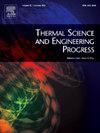纳米流体与机器学习的动态协同适应:自优化聚光太阳能发电系统的闭环框架
IF 5.4
3区 工程技术
Q2 ENERGY & FUELS
引用次数: 0
摘要
聚光太阳能(CSP)系统在热管理方面面临着持续的挑战,传统的传热流体难以缓解太阳辐照度波动下的局部热点和动态热梯度。本研究引入了一种新颖的闭环框架,该框架开创了定制石墨烯纳米流体与混合机器学习(ML)架构的自适应集成,用于CSP系统的自优化控制。与之前专注于静态纳米流体优化或独立机器学习预测的研究不同,我们的框架实现了一个动态的、实时的反馈回路,其中纳米流体性能通知机器学习控制,反之亦然。结果表明,这种协同作用带来了明显的好处:与传统的金属氧化物相比,石墨烯纳米流体减少了32%的热分层,而神经网络模型在预测最佳操作参数方面的准确率达到了94%。通过将这些ML洞察嵌入到系统的控制逻辑中,我们能够自我优化CSP操作,自主适应环境波动,在不增加硬件的情况下减少18%的热损失。这项工作在材料创新和智能控制之间架起了桥梁,为提高电网规模部署的CSP可靠性和效率提供了可扩展的途径。本文章由计算机程序翻译,如有差异,请以英文原文为准。
Dynamic co-adaptation of nanofluids and machine learning: a closed-loop framework for self-optimizing concentrated solar power systems
Concentrated Solar Power (CSP) systems face persistent challenges in thermal management, where conventional heat transfer fluids struggle to mitigate localized hotspots and dynamic thermal gradients under fluctuating solar irradiance. This study introduces a novel closed-loop framework that pioneers the co-adaptive integration of tailored graphene nanofluids with a hybrid machine learning (ML) architecture for the self-optimizing control of CSP systems. Unlike prior studies focusing on static nanofluid optimization or standalone ML prediction, our framework enables a dynamic, real-time feedback loop where nanofluid performance informs ML control and vice versa. Results demonstrate the tangible benefits of this synergy: graphene nanofluids reduced thermal stratification by 32% compared to conventional metal oxides, while the Neural Network model achieved 94% accuracy in predicting optimal operating parameters. By embedding these ML insights into the system’s control logic, we enabled self-optimizing CSP operation that autonomously adapted to environmental volatility, reducing thermal losses by 18% without additional hardware. This work bridges material innovation and intelligent control, offering a scalable pathway to enhance CSP reliability and efficiency for grid-scale deployments.
求助全文
通过发布文献求助,成功后即可免费获取论文全文。
去求助
来源期刊

Thermal Science and Engineering Progress
Chemical Engineering-Fluid Flow and Transfer Processes
CiteScore
7.20
自引率
10.40%
发文量
327
审稿时长
41 days
期刊介绍:
Thermal Science and Engineering Progress (TSEP) publishes original, high-quality research articles that span activities ranging from fundamental scientific research and discussion of the more controversial thermodynamic theories, to developments in thermal engineering that are in many instances examples of the way scientists and engineers are addressing the challenges facing a growing population – smart cities and global warming – maximising thermodynamic efficiencies and minimising all heat losses. It is intended that these will be of current relevance and interest to industry, academia and other practitioners. It is evident that many specialised journals in thermal and, to some extent, in fluid disciplines tend to focus on topics that can be classified as fundamental in nature, or are ‘applied’ and near-market. Thermal Science and Engineering Progress will bridge the gap between these two areas, allowing authors to make an easy choice, should they or a journal editor feel that their papers are ‘out of scope’ when considering other journals. The range of topics covered by Thermal Science and Engineering Progress addresses the rapid rate of development being made in thermal transfer processes as they affect traditional fields, and important growth in the topical research areas of aerospace, thermal biological and medical systems, electronics and nano-technologies, renewable energy systems, food production (including agriculture), and the need to minimise man-made thermal impacts on climate change. Review articles on appropriate topics for TSEP are encouraged, although until TSEP is fully established, these will be limited in number. Before submitting such articles, please contact one of the Editors, or a member of the Editorial Advisory Board with an outline of your proposal and your expertise in the area of your review.
 求助内容:
求助内容: 应助结果提醒方式:
应助结果提醒方式:


